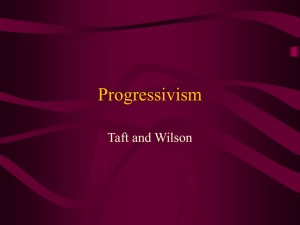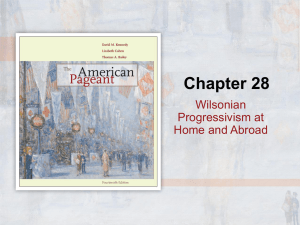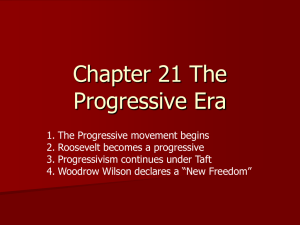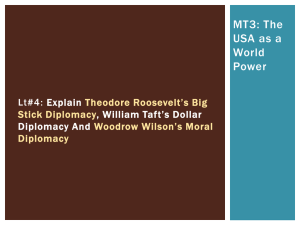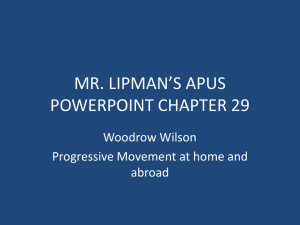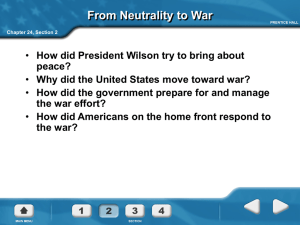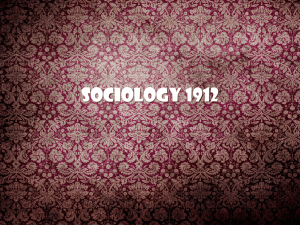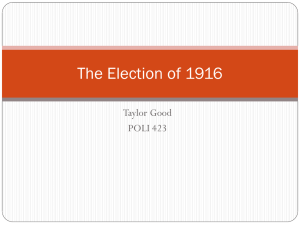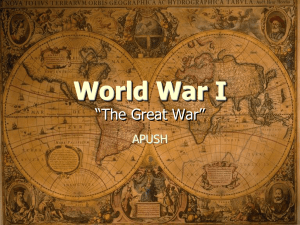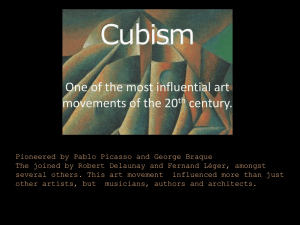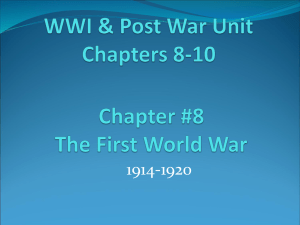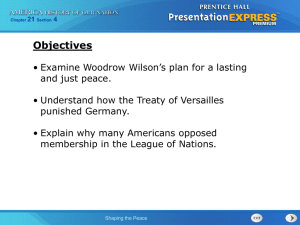Election of 1912
advertisement
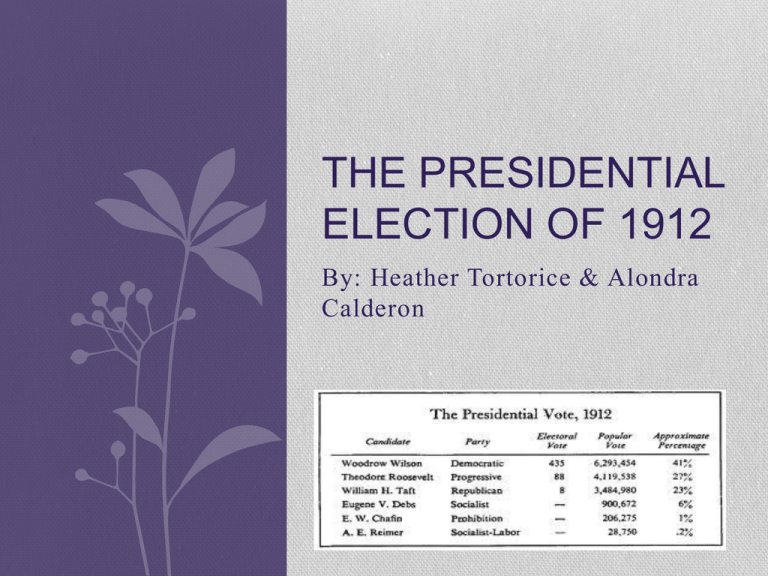
THE PRESIDENTIAL ELECTION OF 1912 By: Heather Tortorice & Alondra Calderon Election of 1912 • Occurred on Tuesday November 5,1912 • 32nd presidential election • 4 men were running: Republican Party ( William H. Taft), Democratic Party ( Woodrow Wilson), Socialist Party ( Eugene V. Debs), Progressive Party (Theodore Roosevelt) • Wilson won the election, gaining a large majority in the Electoral College and winning 42% of the popular vote • the first election in which all 48 States of America participated • ("1912 Presidential Election." ) Woodrow Wilson • Born in Staunton, Virginia, on December 28, 1856 • In 1910, Wilson ran for Governor of New Jersey Wilson began his graduate studies at Johns Hopkins University in 1883 and three years later completed his doctoral dissertation, "Congressional Government: A Study in American Politics” • Wilson's popularity as governor and his status in the national media gave impetus to his presidential campaign in 1912 • ("Woodrow Wilson | The White House." ) Woodrow Wilson Becomes President • Won the election of 1912 • Democratic Party • Chose Indiana Governor Thomas R. Marshall as his running mate • Was finally nominated on the 46th ballot of a contentious convention He got support for the election from William Jennings Bryan and three-time Democratic presidential candidate who still had a large and loyal following in 1912 • Wilson became the only elected president from the Democratic Party between 1892 and 1932 • Quickly after his election he persuaded congress to pass major progressive reforms • ("Woodrow Wilson | The White House." ) Taft and Roosevelt • They both ran for the presidential election of 1912 • President William Howard Taft was renominated by the Republican Party with the support of its conservative wing • After former President Theodore Roosevelt failed to receive the Republican nomination, he called his own convention and created the Progressive Party Taft’s percentage in votes was 23% • Roosevelt’s percentage in votes was 27% • ("William Howard Taft | The White House." ) • ("Theodore Roosevelt | The White House." ) Conflicts Between Taft and Roosevelt that Led to Wilson’s Election • Both Roosevelt and Taft lost to Wilson in the presidential election of 1912 • During Taft's administration, a rift grew between Roosevelt and Taft as they became the leaders of the Republican Party's two wings: the progressives, led by Roosevelt, and the conservatives, led by Taft • Roosevelt chose Taft as his successor in which would help but Taft did not achieve his job so they went off to different directions • The progressives had different ideas and where more in favor of some things than the conservatives • By 1910 the split between the two wings of the Republican Party occurred and caused Taft and Roosevelt to turn against each other this is what caused their unpopularity during presidential elections • (“United States presidential election, 1912”) Electoral College & Popular Votes Electoral Votes • Roosevelt 88 • Wilson 435 • Taft 8 • Debs 0 Popular Votes • Roosevelt 4,122,721 • Wilson 6,296,284 • Taft 3,486,242 • Debs 901,551 • ("PBS - American Experience: Woodrow Wilson | Special Features | Win the Election of 1912." ) Voting Percentages • Roosevelt 27% • Wilson 41% • Taft 23% • Debs 6% • ("PBS - American Experience: Woodrow Wilson | Special Features | Win the Election of 1912." ) Woodrow Wilson- Democratic Party • Women's Suffrage - Refused to address woman's suffrage as a federal issue. • Race - Appealed to African-American voters with only general assurances, so as not to alienate some voters. • Trusts - Believed in breaking up the trusts into several small, independent companies. • Tariffs - Thought tariffs should be lowered across the board. • Labor - Advocated the much-needed rights of labor, in order to find a fine balance between the needs of the economy and the needs of the worker. • ("Woodrow Wilson | The White House." ) Theodore Roosevelt- Progressive Party • Women's Suffrage - Favored a constitutional amendment allowing woman's suffrage, but did so in a manner which did not alienate antisuffrage voters. • Race - Ignored race issues in order to appeal to certain blocks of voters. • Trusts - Believed in regulating the trusts by federal oversight. • Tariffs - Thought tariff protections should be maintained, but should be scientifically regulated on an industry-by-industry basis by an expert administrative body. • Labor - Advocated the much-needed rights of labor, in order to find a fine balance between the needs of the economy and the needs of the worker. • ("Theodore Roosevelt | The White House." ) William Howard Taft- Republican Party • Women's Suffrage - Strongly opposed any legislation which would support a woman's right to vote. • Race - Ignored race issues in order to appeal to certain blocks of voters. • Trusts - Believed in promoting American business, including the trusts. • Tariffs - Thought the tariff should be enforced and expanded as a means to promote American business and protect American labor. • Labor - Favored a laissez-faire approach to the labor-capital relationship, which would allow the courts to rule against labor unions as laws dictated back in 1912. • ("William Howard Taft | The White House." ) Eugene Debs- Socialist Party • Women's Suffrage - Strongly supported a constitutional amendment allowing women the right to vote. • Race - Strongly advocated racial equality under the law. • Trusts - Believed the trusts should be controlled by collective worker ownership. • Tariffs - Thought the tariff issue was an inconsequential "sham battle" relative to the more compelling plight of labor. • Labor - Held as his highest campaign priority to make laws protecting and enhancing labor's rights at all costs. • ("PBS - American Experience: Woodrow Wilson | People." ) Works Cited "Woodrow Wilson - Wikipedia, the free encyclopedia." Wikipedia, the free encyclopedia. N.p., n.d. Web. 7 Oct. 2013. <http://en.wikipedia.org/wiki/Woodrow_Wilson "United States presidential election, 1912 - Wikipedia, the free encyclopedia." Wikipedia, the free encyclopedia. N.p., n.d. Web. 7 Oct. 2013. <http://en.wikipedia.org/wiki/United_States_presidential_election,_1912>. "Election of 1912 - Presidential Election of 1912." American History From About. N.p., n.d. Web. 9 Oct. 2013. <http://americanhistory.about.com/od/elections/p/election1912.htm>. "PBS - American Experience: Woodrow Wilson | Wilson- A Portrait." PBS: Public Broadcasting Service. N.p., n.d. Web. 9 Oct. 2013. <http://www.pbs.org/wgbh/amex/wilson/portrait/wp_election.html>. "1912 Presidential Election." The American Presidency Project. N.p., n.d. Web. 9 Oct. 2013. <http://www.presidency.ucsb.edu/showelection.php?year=1912#axzz2hC1K8Skv>. "William Howard Taft | The White House." The White House. N.p., n.d. Web. 9 Oct. 2013. <http://www.whitehouse.gov/about/presidents "Woodrow Wilson | The White House." The White House. N.p., n.d. Web. 9 Oct. 2013. <http://www.whitehouse.gov/about/presidents/woodrowwilson>. "Theodore Roosevelt | The White House." The White House. N.p., n.d. Web. 9 Oct. 2013. <http://www.whitehouse.gov/about/presidents "President Elect - 1912." President Elect. N.p., n.d. Web. 9 Oct. 2013. <http://presidentelect.org/e1912.html>. "PBS - American Experience: Woodrow Wilson | Special Features | Win the Election of 1912." PBS: Public Broadcasting Service. N.p., n.d. Web. 9 Oct. 2013. <http://www.pbs.org/wgbh/amex/wilson/sfe "PBS - American Experience: Woodrow Wilson | People." PBS: Public Broadcasting Service. N.p., n.d. Web. 9 Oct. 2013. <http://www.pbs.org/wgbh/amex/wilson/peo
